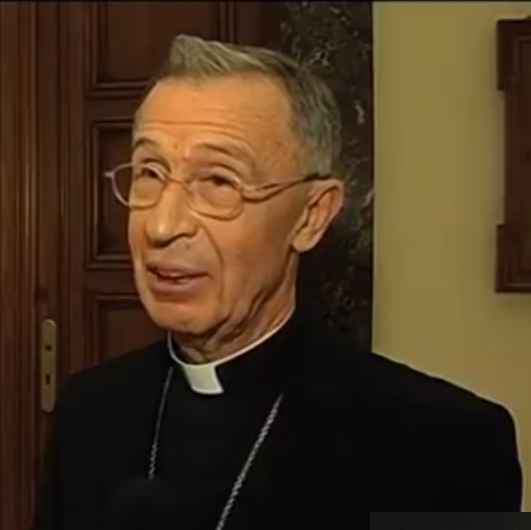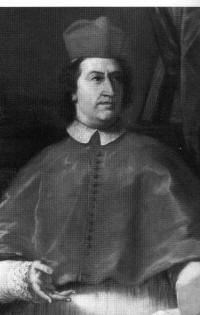|
Giovanni Battista Bussi (1656–1726)
Giovanni Battista Bussi (31 March 1656 in Viterbo – 23 December 1726 in Rome) was an Italian cardinal. Life Born in the Papal States to a family which provided many ecclesiastics, Giovanni studied at the archiginnasio della Sapienza and in 1691 was granted a canonry in St Peter's Basilica and entrusted with the management of the Ospedale di Santo Spirito in Sassia nearby by Pope Innocent XII. He was sent to Flanders in 1693 to fight the spread of Jansenism and in 1703 contributed to the condemnation for Jansenism of Petrus Codde, apostolic vicar to Holland and archbishop of Sebaste. Bussi was elected archbishop of Tarsus ''in partibus'' and promoted to the nuntiature of "Germania inferiore" at Cologne. On 12 Sep 1706, he was consecrated bishop by Christian August von Sachsen-Zeitz, Bishop of Győr, with Giulio Piazza, Titular Archbishop of ''Rhodus'', and Johannes Werner von Veyder, Titular Bishop of ''Eleutheropolis in Macedonia'' and Auxiliary Bishop of Cologn ... [...More Info...] [...Related Items...] OR: [Wikipedia] [Google] [Baidu] |
Catholic Church
The Catholic Church, also known as the Roman Catholic Church, is the largest Christian church, with 1.3 billion baptized Catholics worldwide . It is among the world's oldest and largest international institutions, and has played a prominent role in the history and development of Western civilization. O'Collins, p. v (preface). The church consists of 24 ''sui iuris'' churches, including the Latin Church and 23 Eastern Catholic Churches, which comprise almost 3,500 dioceses and eparchies located around the world. The pope, who is the bishop of Rome, is the chief pastor of the church. The bishopric of Rome, known as the Holy See, is the central governing authority of the church. The administrative body of the Holy See, the Roman Curia, has its principal offices in Vatican City, a small enclave of the Italian city of Rome, of which the pope is head of state. The core beliefs of Catholicism are found in the Nicene Creed. The Catholic Church teaches that it is the ... [...More Info...] [...Related Items...] OR: [Wikipedia] [Google] [Baidu] |
Consecrated
Consecration is the solemn dedication to a special purpose or service. The word ''consecration'' literally means "association with the sacred". Persons, places, or things can be consecrated, and the term is used in various ways by different groups. The origin of the word comes from the Latin stem ''consecrat'', which means dedicated, devoted, and sacred. A synonym for consecration is sanctification; its antonym is desecration. Buddhism Images of the Buddha and bodhisattvas are ceremonially consecrated in a broad range of Buddhist rituals that vary depending on the Buddhist traditions. Buddhābhiseka is a Pali and Sanskrit term referring to these consecration rituals. Christianity In Christianity, consecration means "setting apart" a person, as well as a building or object, for God. Among some Christian denominations there is a complementary service of " deconsecration", to remove a consecrated place of its sacred character in preparation for either demolition or sale fo ... [...More Info...] [...Related Items...] OR: [Wikipedia] [Google] [Baidu] |
Congregation (Roman Curia)
In the Roman Curia, a congregation ( lat, Sacræ Cardinalium Congregationes) is a type of department of the Curia. They are second-highest-ranking departments, ranking below the two Secretariats, and above the pontifical councils, pontifical commissions, tribunals and offices. Originally, congregations were select groups of cardinals drawn from the College of Cardinals, commissioned to take care of some field of activity that concerned the Holy See. Today, as a result of a decision of the Second Vatican Council, members include diocesan bishops from diverse parts of the world who are not cardinals. Each congregation also has a permanent staff. Each congregation is led by a Prefect, who is usually a cardinal.René Metz, ''Twentieth Century Encyclopedia of Catholicism, Vol. 80: What is Canon Law?'' (New York: Hawthorn Books, 1960), pp. 99-101 Until recently, a non-cardinal appointed to head a congregation was styled pro-prefect until made a cardinal. This practice has been aba ... [...More Info...] [...Related Items...] OR: [Wikipedia] [Google] [Baidu] |
Pope Clement XI
Pope Clement XI ( la, Clemens XI; it, Clemente XI; 23 July 1649 – 19 March 1721), born Giovanni Francesco Albani, was head of the Catholic Church and ruler of the Papal States from 23 November 1700 to his death in March 1721. Clement XI was a patron of the arts and of science. He was also a great benefactor of the Vatican Library; his interest in archaeology is credited with saving much of Rome's antiquity. He authorized expeditions which succeeded in rediscovering various ancient Christian writings and authorized excavations of the Roman catacombs. Biography Early life Giovanni Francesco Albani was born in 1649 in Urbino to the Albani family, a distinguished family of Albanian origin in central Italy. His mother Elena Mosca (1630-1698) was a high-standing Italian of bergamasque origin, descended from the noble Mosca family of Pesaro. His father Carlo Albani (1623-1684) was a patrician. His mother descended in part from the Staccoli family, who were patricians of Ur ... [...More Info...] [...Related Items...] OR: [Wikipedia] [Google] [Baidu] |
Archbishop Of Ancona
In Christian denominations, an archbishop is a bishop of higher rank or office. In most cases, such as the Catholic Church, there are many archbishops who either have jurisdiction over an ecclesiastical province in addition to their own archdiocese (#Non-metropolitan_archiepiscopal_sees, with some exceptions), or are otherwise granted a Titular bishop, titular archbishopric. In others, such as the Lutheranism, Lutheran Church of Sweden and the Church of England, the title is borne by the leader of the denomination. Etymology The word archbishop () comes via the Latin ''archiepiscopus.'' This in turn comes from the Greek language, Greek , which has as components the etymons -, meaning 'chief', , 'over', and , 'seer'. Early history The earliest appearance of neither the title nor the role can be traced. The title of "metropolitan" was apparently well known by the 4th century, when there are references in the canons of the First Council of Nicæa of 325 and Synods of Antioch, Co ... [...More Info...] [...Related Items...] OR: [Wikipedia] [Google] [Baidu] |
Catholic-Hierarchy
''Catholic-Hierarchy.org'' is an online database of bishops and dioceses of the Roman Catholic Church and Eastern Catholic Churches. The website is not officially sanctioned by the Church. It is run as a private project by David M. Cheney in Kansas City.Katholisch Deutsch: "Sie sammeln das Wissen der Weltkirche" Von Felix Neumann 08.08.2017 Origin and contents In the 1990s, David M. Cheney created a simple internet website that documented the Roman Catholic bishops in his home state of Texas—many of whom did not have webpages. In 2002, after moving to the Midwest, he officially created the present website catholic-hierarchy.org and expanded to cover the United States and eventually the world.[...More Info...] [...Related Items...] OR: [Wikipedia] [Google] [Baidu] |
Florida International University
Florida International University (FIU) is a public research university with its main campus in Miami-Dade County. Founded in 1965, the school opened its doors to students in 1972. FIU has grown to become the third-largest university in Florida and the fifth-largest public university in the United States by enrollment. FIU is a constituent part of the State University System of Florida. In 2021, it was ranked #1 in the Florida Board of Governors performance funding, and had over $246 million in research expenditures. The university is classified among "R1: Doctoral Universities – Very high research activity". FIU has 11 colleges and more than 40 centers, facilities, labs, and institutes that offer more than 200 programs of study. It has an annual budget of over $1.7 billion and an annual economic impact of over $5 billion. The university is accredited by the Southern Association of Colleges and Schools (SACS). FIU's intercollegiate sports teams, the FIU Panthers, compe ... [...More Info...] [...Related Items...] OR: [Wikipedia] [Google] [Baidu] |
Co-consecrators
A consecrator is a bishop who ordains someone to the episcopacy. A co-consecrator is someone who assists the consecrator bishop in the act of ordaining a new bishop. The terms are used in the canon law of the Catholic Church, Lutheran Churches, in Anglican communities, and in the Eastern Orthodox Church. History The church has always sought to assemble as many bishops as possible for the election and consecration of new bishops. Although due to difficulties in travel, timing, and frequency of consecrations, this was reduced to the requirement that all comprovincial (of the same province) bishops participate. At the Council of Nicæa it was further enacted that "a bishop ought to be chosen by all the bishops of his province, but if that is impossible because of some urgent necessity, or because of the length of the journey, let three bishops at least assemble and proceed to the consecration, having the written permission of the absent." Consecrations by the Pope were exempt fr ... [...More Info...] [...Related Items...] OR: [Wikipedia] [Google] [Baidu] |
Bishop Of Cologne
The Archbishop of Cologne is an archbishop governing the Archdiocese of Cologne of the Catholic Church in western North Rhine-Westphalia and is also a historical state in the Rhine holding the birthplace of Beethoven and northern Rhineland-Palatinate in Germany and was ''ex officio'' one of the Prince-electors of the Holy Roman Empire, the Elector of Cologne, from 1356 to 1801. Since the early days of the Catholic Church, there have been ninety-four bishops and archbishops of Cologne. Seven of these ninety-four retired by resignation, including four resignations which were in response to impeachment. Eight of the bishops and archbishops were coadjutor bishops before they took office. Seven individuals were appointed as coadjutors freely by the Pope. One of the ninety-four moved to the Curia, where he became a cardinal. Additionally, six of the archbishops of Cologne were chairmen of the German Bishops' Conference. Cardinal Rainer Woelki has been the Archbishop of Cologne since hi ... [...More Info...] [...Related Items...] OR: [Wikipedia] [Google] [Baidu] |
Titular Bishop
A titular bishop in various churches is a bishop who is not in charge of a diocese. By definition, a bishop is an "overseer" of a community of the faithful, so when a priest is ordained a bishop, the tradition of the Catholic, Eastern Orthodox and Oriental Orthodox churches is that he be ordained for a specific place. There are more bishops than there are functioning dioceses. Therefore, a priest appointed not to head a diocese as its diocesan bishop but to be an auxiliary bishop, a papal diplomat, or an official of the Roman Curia is appointed to a titular see. Catholic Church In the Catholic Church, a titular bishop is a bishop who is not in charge of a diocese. Examples of bishops belonging to this category are coadjutor bishops, auxiliary bishops, bishops emeriti, vicars apostolic, nuncios, superiors of departments in the Roman Curia, and cardinal bishops of suburbicarian dioceses (since they are not in charge of the suburbicarian dioceses). Most titular bi ... [...More Info...] [...Related Items...] OR: [Wikipedia] [Google] [Baidu] |
Johannes Werner Von Veyder
Johannes is a Medieval Latin form of the personal name that usually appears as "John" in English language contexts. It is a variant of the Greek and Classical Latin variants (Ιωάννης, ''Ioannes''), itself derived from the Hebrew name '' Yehochanan'', meaning "Yahweh is gracious". The name became popular in Northern Europe, especially in Germany because of Christianity. Common German variants for Johannes are ''Johann'', ''Hannes'', '' Hans'' (diminutized to ''Hänschen'' or ''Hänsel'', as known from "''Hansel and Gretel''", a fairy tale by the Grimm brothers), '' Jens'' (from Danish) and ''Jan'' (from Dutch, and found in many countries). In the Netherlands, Johannes was without interruption the most common masculine birth name until 1989. The English equivalent for Johannes is John. In other languages *Joan, Jan, Gjon, Gjin and Gjovalin in Albanian *'' Yoe'' or '' Yohe'', uncommon American form''Dictionary of American Family Names'', Oxford University Press, 2013. *Yaḥy ... [...More Info...] [...Related Items...] OR: [Wikipedia] [Google] [Baidu] |
.jpg)





